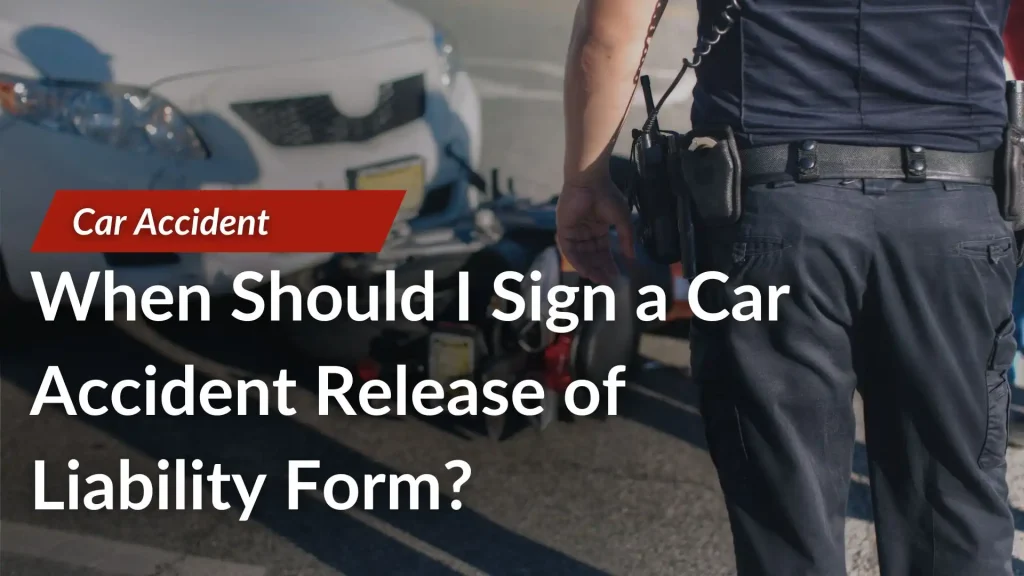 It can be confusing if an insurance company asks you to sign a release of liability form after a car accident. This is double true if you still deal with injuries and medical bills. This form might seem like a step toward resolving your case, but signing it could cost you full compensation. Learn more about the car accident release of liability form in this post.
It can be confusing if an insurance company asks you to sign a release of liability form after a car accident. This is double true if you still deal with injuries and medical bills. This form might seem like a step toward resolving your case, but signing it could cost you full compensation. Learn more about the car accident release of liability form in this post.
Before making a decision, speaking with a lawyer is essential. A Tampa car accident lawyer from Jurewitz Law Group Injury & Accident Lawyers can review the form, explain what you might be giving up, and help you decide if signing is the best option in your situation. The following information explains a release of liability form and what signing it means.
What Is a Car Accident Release of Liability Form?
A car accident release of liability form is a legal document. It usually accompanies or is included in a settlement agreement between you, the at-fault party, or their insurance company. By signing this form, you agree not to pursue any further compensation related to the accident. This is true even if new injuries or losses arise later. Essentially, you’re releasing the at-fault party from any additional liability, so you can’t file another claim or lawsuit for the same incident.
An insurance company will usually present you with a release of liability form when they offer you a settlement. While it might seem straightforward to close your case, it’s not. Signing it without fully understanding the consequences can be risky. Once you sign a release of liability, you lose your right to seek any additional compensation, regardless of what happens in the future. That’s why it’s crucial to consult with an attorney before signing. Your lawyer can ensure you’re making the best decision for your situation.
Risks of Signing a Car Accident Release of Liability Too Soon
Signing a car accident release of liability too soon can expose you to significant risks. If you sign without fully understanding the extent of your injuries or financial losses, you might settle for an amount that doesn’t cover all your needs. Some injuries, like whiplash or concussions, can take days or even weeks to show symptoms. If you sign the release before you’re healed, you give up your right to seek additional compensation if those injuries worsen.
Additionally, you can’t ask for more money later once you sign the release, even if new costs arise. Insurance companies might pressure you to settle quickly, but their goal is to minimize their payout. That’s why it’s crucial to talk to a lawyer before signing anything. An attorney can explain your rights, evaluate the settlement offer, and protect you from making a decision that could negatively impact your future.
Factors To Consider Before Signing a Release of Liability Waiver
Before signing a release of liability after a car accident, it’s important to carefully consider several key factors to ensure you’re making the right decision for your situation. These factors include:
The Full Extent of Your Injuries
Consider whether you truly understand the full scope of your injuries. Some injuries might not be immediately apparent or could worsen over time. It’s crucial to wait until you’ve received a complete medical evaluation. Before signing any waiver, you need a clear understanding of your long-term health needs.
Future Medical Costs
Think about the potential for ongoing medical expenses. If your injuries require future treatments, surgeries, or rehabilitation, you must ensure the settlement covers these costs. Signing a release too soon could leave you responsible for significant out-of-pocket expenses.
Lost Wages and Earning Capacity
Consider the impact of the accident on your ability to work. If your injuries have caused you to miss work or will affect your ability to earn in the future, the settlement should adequately compensate you for these losses.
Legal Advice
Finally, always seek legal advice before signing any release of liability. An attorney can help you evaluate whether the settlement is fair and protect you from making a decision that might not be in your best interest.
What Happens If You Don’t Sign a Car Accident Release of Liability
 When you don’t sign a car accident release right away, you’re keeping your options open. If you don’t sign the release, you can fully evaluate the extent of your injuries and financial losses before accepting any settlement. This can be crucial if you’re unsure about a settlement offer’s fairness or are still undergoing medical treatment.
When you don’t sign a car accident release right away, you’re keeping your options open. If you don’t sign the release, you can fully evaluate the extent of your injuries and financial losses before accepting any settlement. This can be crucial if you’re unsure about a settlement offer’s fairness or are still undergoing medical treatment.
By not signing immediately, you retain the right to negotiate a better settlement or even pursue a lawsuit if necessary. Insurance companies might pressure you to sign quickly, but you have the legal right to take your time. An attorney can explain your rights and your options. A lawyer can help you make an informed choice that protects your financial and physical well-being.
Deadline to File a Car Accident Lawsuit in Florida
If you reject an insurance company’s settlement offer and don’t sign their release of liability form, you may have to file a lawsuit to get a fair deal. In Florida, you usually have two years from the car accident date to file a lawsuit. A car accident lawyer can help you file a lawsuit, gather essential evidence to prove your case and maximize your compensation.
How Our Tampa Car Accident Attorneys Can Help You
The team at Jurewitz Law Group Injury & Accident Lawyers can explain the details of any car accident settlement you’re offered. We can evaluate whether it’s in your interest to sign a release of liability form. Our Tampa car accident attorneys will carefully review your settlement offer and assess whether it truly covers your current and future needs. We’ll explain the implications of signing a liability waiver and see that you don’t give up your rights without proper compensation. Let us handle the legal details so you can confidently focus on your recovery. Call (619) 233-5020 now or complete our contact form for a free case evaluation. Check out our recent victories to understand how we can help you with your case.
Related Posts:
How Long After a Car Accident Can Injuries Appear?
Can Someone Sue You for a Car Accident If You Have Insurance?
When Is It Too Late to Go to the Doctor After a Car Accident?


